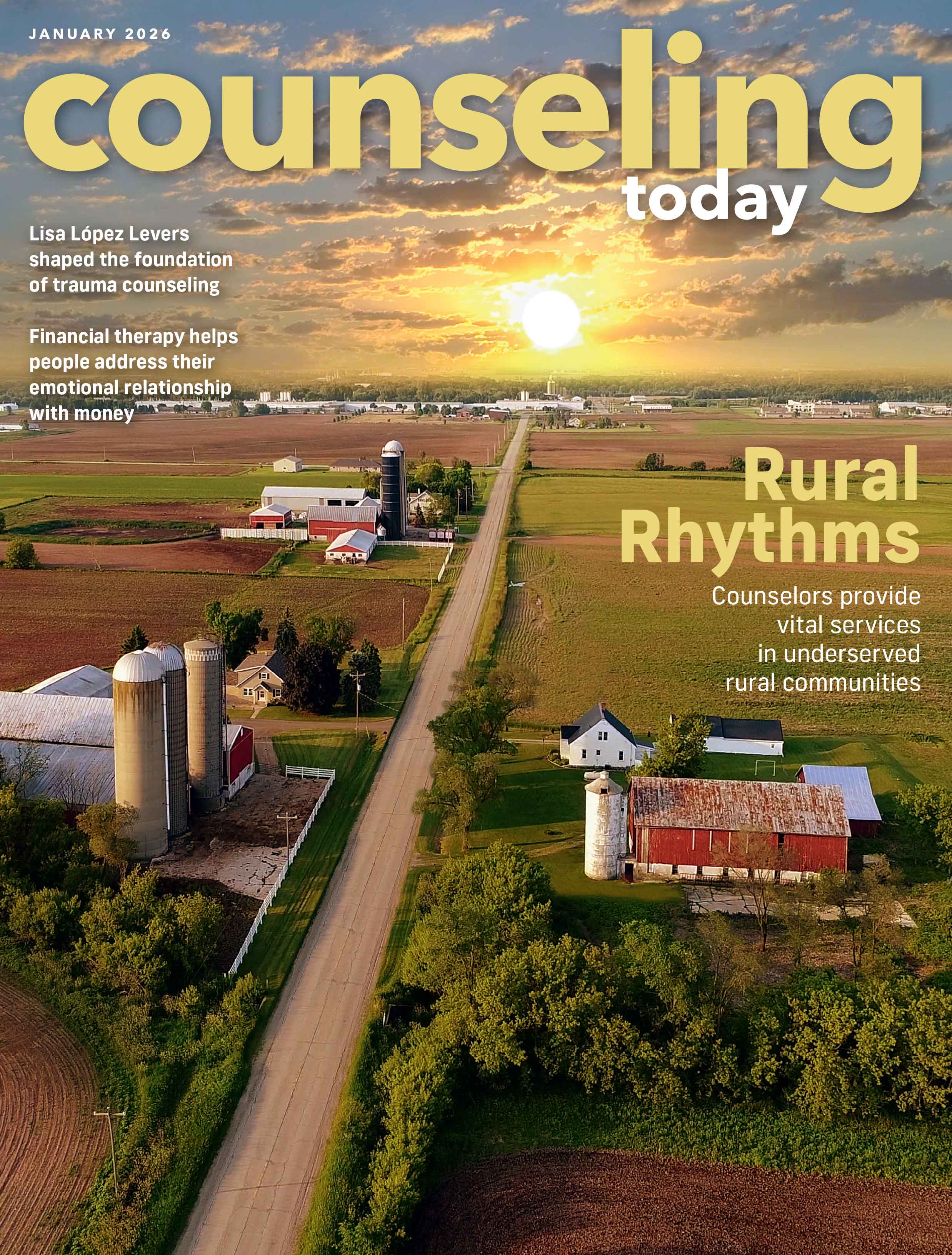Sex Education: Let’s Talk About It
By Jennifer L.W. Fink
July 2025

How much did you learn about sex and sexuality throughout your counselor education? Nothing? Or almost nothing?
Sadly, that’s the status quo for most counselors in the U.S. Licensed professional counselor (LPC) education programs are not required to include a human sexuality course, and just two states (Florida and California) require counselors to take a human sexuality course to be licensed. Amber L. Pope, PhD, LPC, LMHC, president-elect of the Association of Counseling Sexology & Sexual Wellness (ACSSW), and colleagues surveyed 191 clinical mental health counseling programs and found that fewer than half (45%) offer a standalone sexuality counseling course. Only 15% require one, according to research published in May in the Journal of Counseling Sexology & Sexual Wellness.
“I think sex was mentioned briefly once — during my master’s program, in a marriage and family course,” says Sandra Urzua, LPC, owner of Pure Guidance Counseling in San Antonio.
When she entered practice, Urzua realized how unprepared she was to help her clients. “I came across a lot of different types of couples, including those in open relationships and polyamorous relationships,” she says. Some of those clients were in therapy to deal with anxiety and depression; others, to resolve relationship conflicts. Sexuality wasn’t the “problem” that brought them to counseling, but it was part of their lives.
Urzua realized she needed to learn more to better serve her clients. She embarked on a course of self-education and is now completing a PhD in counseling education and supervision “because I want to be able to teach students everything that I had to learn on my own,” she says.
“Sexuality really needs to be something that all counselors feel prepared to talk about with their clients.”
The Sex Gap
“Sex” is defined as sexual activity or the categories most living organisms are divided into based on their reproductive functions, while “sexuality” is the capacity for sexual feeling or a person’s identity in relation to gender and attraction. Although both are core components of the human experience, their inclusion or exclusion in counselor education has been marked by morality, stigma and shame. Homosexuality wasn’t removed from the Diagnostic and Statistical Manual of Mental Disorders until 1973, and kink and BDSM interests were classified as a “sexual deviation” — and therefore mental illness — until as recently as 1994.
“The historical focus on dysfunction and treatment in the field, rather than a wellness-based approach to sexuality, has contributed to the lack of integration of sexuality education in counseling programs,” Pope says.
Also playing a factor is Americans’ lack of basic sex education and broad discomfort talking about sex. Fifty-five percent of Americans say their parents never had “the talk” with them, according to SIECUS: Sex Ed for Social Change. Only three states require comprehensive sex education to be taught in all K-12 schools, so most college students (and professors) arrive on campus with limited knowledge and little to no experience discussing sex or sexuality.
“By and large, research shows that the majority of people are uncomfortable talking about sex,” says Mark A. Saunders Sr., PhD, LMFT, LPC, founder of Wellspring of Hope Counseling.
And because CACREP did not explicitly include human sexuality in its foundational counseling curriculum standards until 2024, most counseling education programs did not offer any sexuality courses, allowing continued silence and discomfort. Now, CACREP-accredited programs are required to address “the role of sexual development and sexuality related to overall wellness” as part of lifespan development education, but it’s not yet clear how counseling education programs will integrate sexuality education in the curriculum.
Saunders thinks counseling students should be required to explore their own sexual beliefs and biases, just as they are encouraged to explore their thoughts, beliefs and experiences regarding racism and sexism.
“We as a community are encouraging multicultural competency, so all of our courses include multicultural considerations. But sexuality is not a competency we currently require,” Saunders says.
Steve Ratcliff, LPCC, LPC, LMHC, a sex therapist certified by the American Association of Sexuality Educators, Counselors and Therapists, agrees. “Sexuality is another multicultural topic where, if we don’t confront our ‘stuff,’ we’re very much in danger of perpetrating harm,” he says.
Why It Matters
Most clients don’t come to counseling looking to talk about sex. But many would benefit from frank, nonjudgmental acknowledgement of sexuality.
Data show approximately 30% of couples who seek counseling have some form of sexual distress, Saunders says. Over half of women and about one-third of men experience sexual violence during their lifetimes, according to the U.S Centers for Disease Control and Prevention, which means many counseling clients have a personal history of sexual trauma. Recent data also suggest that kink populations — individuals who engage in consensual nontraditional sexual activities such as BDSM and power exchange — have a suicide rate “far higher than the general population,” Ratcliff says.
When counselors either don’t mention sexuality or react with discomfort or judgment when clients refer to sex or sexuality, healing is hindered and harm can occur. “If we’re not able to support our clients in the way that they need, we’re doing them a disservice,” Urzua says.
Ratcliff is conducting qualitative analysis as a volunteer researcher with the nonprofit TASHRA: The Alternative Sexualities Health Research Alliance. He is examining data from a TASHRA-led study of approximately 650 sexually diverse counseling clients, most of whom sought help for depression, anxiety, grief or relationship challenges. Unfortunately, “a lot of people in this study experienced a tremendous amount of judgmental reaction” from counselors when they mentioned their sexuality, Ratcliff says.
“Sometimes it’s very implicit; sometimes it’s explicit. Sometimes the reaction is, ‘are you safe?’ Sometimes it’s ‘that’s weird, or ‘that is sick,’ or ‘that’s gross.’ Sometimes it goes as far as refusing care,” Ratcliff says. “Because sexuality is such a value-laden topic, it’s one of the areas where I think as clinicians, we are particularly prone to unethical practice such as value imposition or cultural-incompetent care.”
Practical Strategies
To most effectively help clients, counselors need to examine their sexual attitudes and beliefs. Saunders encourages counselors and counselors-in-training to “address your own sexual script,” which has likely been shaped by culture, religion and social mores.
“Think about, what was your first knowledge of sex? Your first experience of sex? What has happened from the time you were born until today, and what does your story say about sex in your life?” Saunders says.
Ratcliff and Urzua both encourage counselors to identify their “icks” — sexual practices they personally dislike or disapprove of. Both also stress it’s normal to experience disgust or dislike, and it’s helpful for counselors to interrogate their reactions with curiosity.
“I ask counselors, ‘What do you think about X? What kind of emotions come up when someone talks about that?’” Urzua says. Often, examining personal reactions helps counselors identify the roots of their responses and manage their emotions and expressions so they can focus on client goals during counseling sessions.
Some counselors may also need to practice talking about sex. If you’re not comfortable saying “penis,” “vagina,” “cunnilingus,” “anal sex,” “fellatio” and variations of each of those terms, start saying them aloud — first in private and then with a trusted friend or colleague. If you’re not confident in your sexual knowledge — anatomical, physiological and practical — study up. A host of organizations, associations and publications offer free and paid sex and sexuality education. ACA’s newest division, ACSSW, hosts monthly education webinars and is developing a credentialing course that might be available in 2026.
Actively include sex and sexuality in your counseling practice. “Integrate some questions about sexuality into your intake forms,” Pope says. “Include a focus on the pleasurable aspects — what do you find pleasurable in terms of emotional or physical intimacy? — instead of just asking if they have sexuality-related concerns.”
You can also introduce the topic during your initial sessions. (Yes, even if the client is there for grief or anxiety.)
“You can simply ask, ‘Would you like to talk about how your sex life is impacted?’” Urzua says. “That opens the door and gives the client the option to consent.” It also lets the client know you’re comfortable talking about sexuality and recognize sex and sexuality as an integral part of the human experience.
Building a Stronger Foundation
Ultimately, counselors and their clients would be better served if human sexuality courses were a required part of counselor education. The inclusion of sexual development and sexuality in the 2024 CACREP standards is a positive step forward. ACSSW’s Research and Scholarship Committee also recently developed 12 Exemplary Practices for Counseling Sexology and Sexuality Wellness. Weaving these topics throughout counselor education is another way to increase counselors’ knowledge of sex and sexuality.
Adoption and integration of sex positivity throughout the curriculum (and in practice) would help as well.
“I like to define sex positivity as approaching sexuality from a universal holistic human experience, free from any judgment or shame, as an aspect of psychological health and overall quality of life,” Urzua says. “Sex positivity means that you’re helping to reduce the stigma and shame that are associated with sex and helping to reduce marginalization and promote self-acceptance.”
A sex-positive framework is a powerful antidote to the silence, discomfort and exclusion that has historically predominated in counselor education. It can also build confidence and competence in the next generations of counselors, equipping them to address sexuality and sexual health with their clients with empathy and ease.


